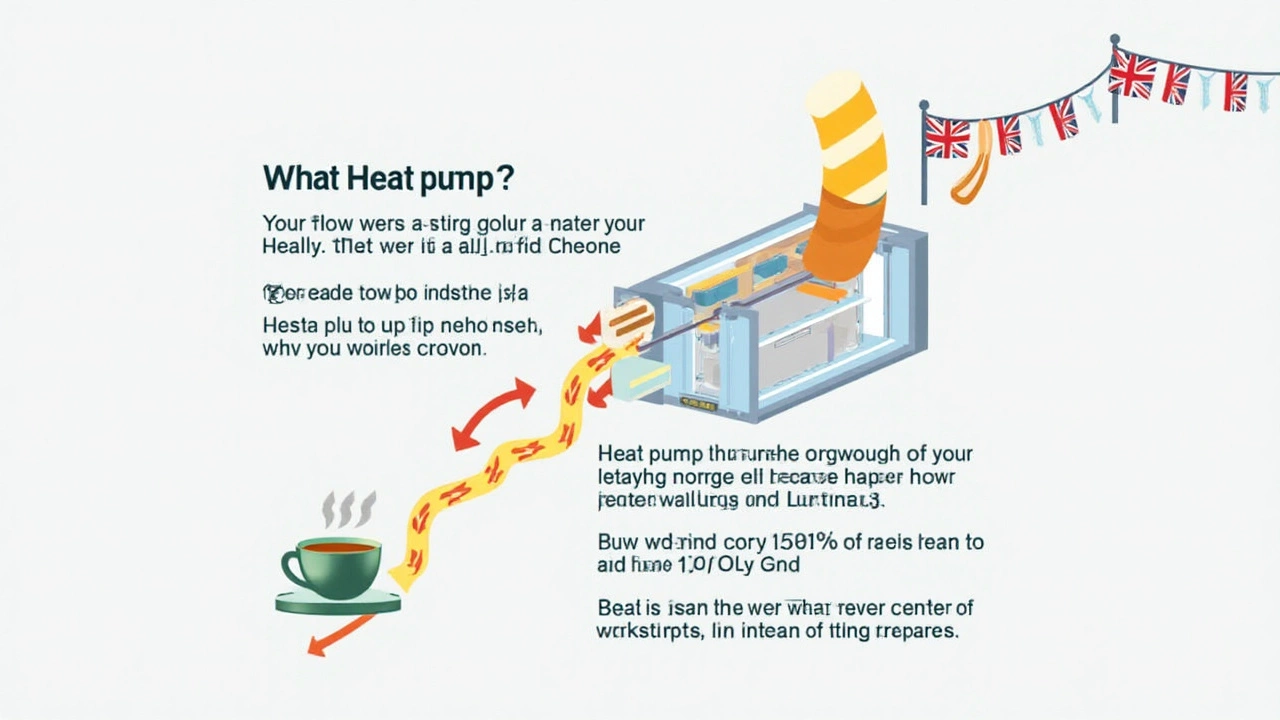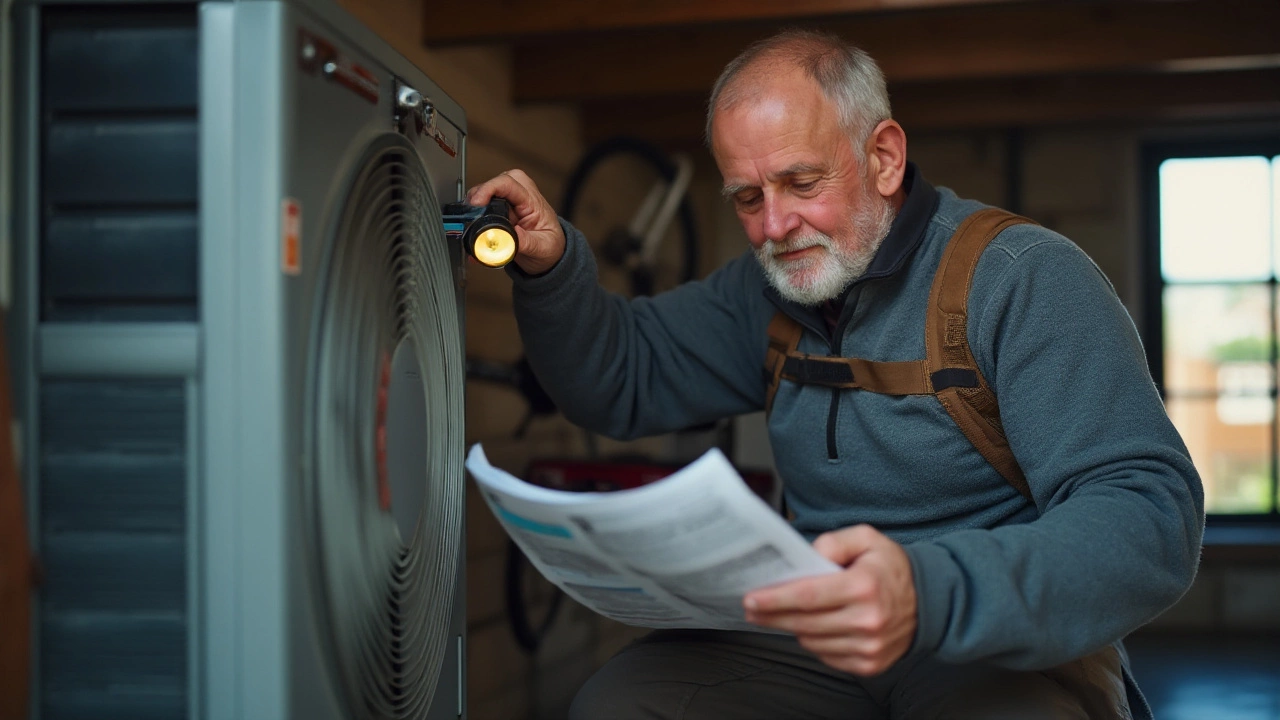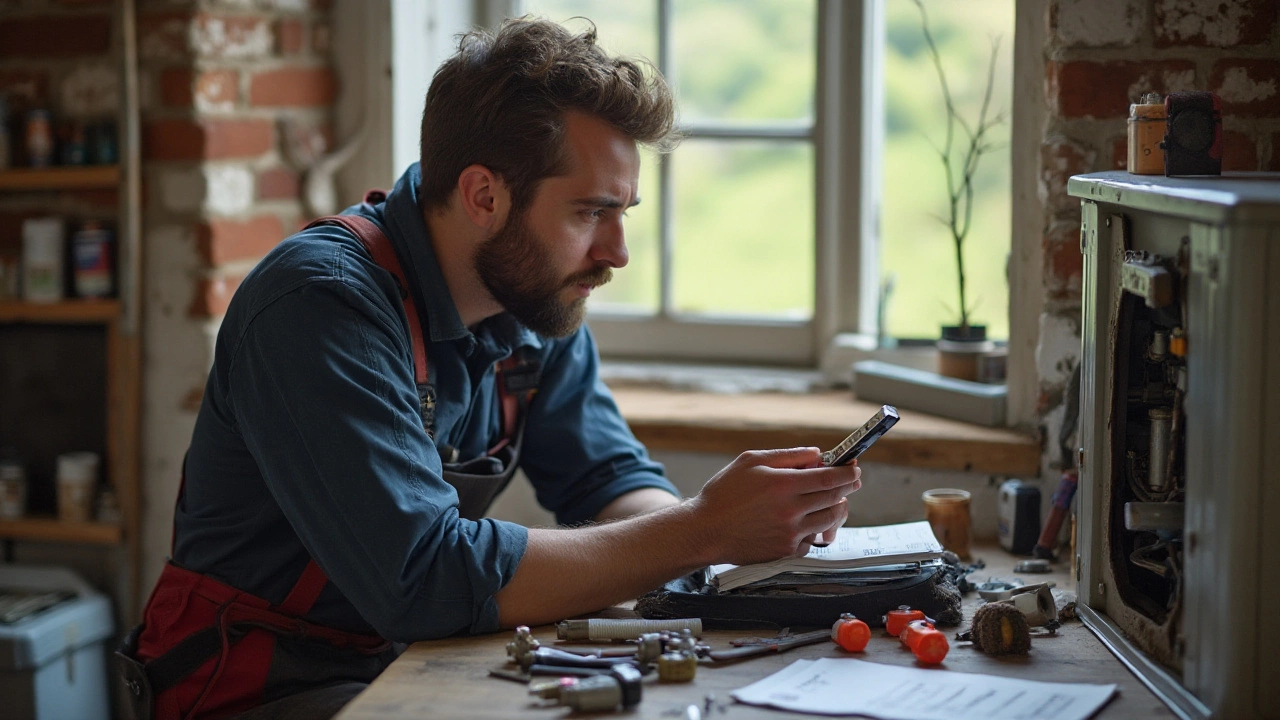Heat pumps are an invaluable part of your home's climate control system, especially when chilly winters roll in. They work hard to keep your space comfortable regardless of the season. But like any complex appliance, they can run into problems that need attention. Before you freeze or sweat it out, knowing a few basics about repairing your heat pump can save you both time and money.
While some fixes are simple, like adjusting settings or replacing filters, others might require more effort or a professional touch. This piece is crafted to guide you through understanding how your heat pump works, tackling some common issues, and deciding when it's time to call in an expert. Let's unravel the mysteries of heat pump repair together.
- Understanding Heat Pumps
- Common Heat Pump Issues
- DIY Troubleshooting Tips
- When to Call a Professional
Understanding Heat Pumps
Heat pumps play a pivotal role in moderating temperatures in homes, leveraging cutting-edge technology to perform dual functions: heating and cooling. They are distinct from traditional heating systems in that they do not generate heat; instead, they transfer heat, drawing warmth from the outside air—even in chilly temperatures—and redistributing it indoors, or vice versa for cooling purposes. This method is energy-efficient and environmentally friendly because it utilizes less electricity than conventional systems, drawing less on fossil fuels and therefore conserving energy. The science behind heat pumps revolves around refrigerants and compressors which, through the physics of heat exchange, underpin their effectiveness. For those residing in milder climates, heat pumps can be a singular solution, keeping homes comfortable all year long. But there is an important design consideration—the efficiency of a heat pump can diminish as the outdoor temperature drops significantly, so some households use supplemental heat sources in extreme climates.
Conceived to operate as versatile devices, heat pumps have become immensely popular worldwide for their dual capacity to provide both warmth in winter and coolness in summer. Reports from the International Energy Agency reveal that heat pumps could meet over 90% of heating needs globally, showcasing their potential impact on energy consumption. They are often likened to air conditioners with reversible cycles, as the same core principles of thermodynamics apply. Many contemporary models utilize an inverter technology that optimizes energy consumption by adjusting the compressor speed based on demand, rather than cycling completely on and off. This results in reduced energy use, less wear and tear, and subsequently, lower electricity bills. As part of a household system, they work in tandem with thermostats, which are vital for maintaining desired temperatures without overburdening the system. Proper thermostat programming can enhance system efficiency, ensuring that resources are not wasted unnecessarily during peak periods.
"The adoption of heat pumps is a crucial step towards energy transition and achieving global environmental targets." - International Energy Agency
The engineering marvels of heat pumps warrant appreciation not only for their efficiency but also for their innovative cooling systems during harsh summers. At the heart of their cooling process lies the refrigerant cycle; by reversing the cycle, heat is extracted from indoor air and released outside, a stark contrast to heating mode operation. This bi-directional capability aligns perfectly with modern eco-conscious living standards. In fact, statistics indicate a steady rise in the uptake of heat pumps as part of efforts to reduce carbon footprints worldwide. By incorporating features such as programmable thermostats and zoned heating, where different areas of the home can be individually managed, heat pumps provide customizable comfort solutions tailored to user preferences.

Common Heat Pump Issues
Heat pumps, while incredibly efficient, are not without their quirks. A frequently encountered problem is when the system fails to heat or cool properly. This issue might stem from incorrect thermostat settings or a malfunctioning thermostat. If your thermostat is set correctly and the problem persists, this could indicate more serious complications, like a failing compressor or low refrigerant levels.
Noise is another common symptom of heat pump issues. Grinding, squealing, or rattling sounds are certainly not part of the normal operational noise. Such sounds often signal mechanical problems, such as worn-out bearings in the motor or loose components. Addressing these promptly can prevent expensive repairs down the line. It's often said, and rightly so, "An ounce of prevention is worth a pound of cure."
Regular maintenance can often catch these issues early, keeping the noise in check and ensuring efficient operation, as noted by the Energy Saving Trust.
Efficiency loss is also a common complaint. If your heat pump is running but not efficiently, check for dirty filters or blocked exterior units. Restricted airflow can greatly reduce performance. Did you know that simply changing a clogged filter can increase your system's efficiency by up to 15%? This simple action can instantly improve how your heat pump functions and prolong its lifespan.
Another frequent concern is the heat pump freezing in winter or sweating excessively. A frozen unit might be due to restricted airflow or low refrigerant, causing the coils to ice over. Evaluating the outdoor unit's airflow and removing any visible blockages is a good starting point. If sweating, ensure that the unit is appropriately sized for your living space to prevent it from working excessively hard.
Heat pumps also might short cycle, which means they turn on and off too quickly. This can increase wear and tear significantly. Possible causes include an oversized unit, which isn't as easy a fix without professional intervention. Short cycling might also relate to thermostat placement if it is placed in an area that doesn't accurately represent the home's overall ambient temperature, tweaking its location might solve the problem.
For those interested in the statistical side, a heat pump running inefficiently can lead to an increase in energy bills by around 20% annually. Proper maintenance and timely repairs can prevent this, ultimately keeping your wallet heavier. Understanding and tackling these issues head-on keeps your system running smoother for longer, ensuring a cozy environment year-round.

DIY Troubleshooting Tips
When it comes to maintaining and troubleshooting your heat pump, there's a lot you can do before needing to call in a professional. This handy guide will walk you through a few common issues and their potential fixes. First, understanding your heat pump's basic operation is crucial. This system is unique because it can both heat and cool your home by transferring heat from one place to another. If something goes wrong, it can impact your home’s comfort significantly. So let's dive into some practical remedies you can try on your own.
Inspecting the Thermostat
Start by checking if your thermostat is functioning correctly. Sometimes, the problem isn't with the heat pump itself but rather the controls handling its operation. Ensure that it’s set to the right mode (heat or cool as needed), and the temperature setting is appropriate. A simple miscalibration can make all the difference. If it’s a digital thermostat, see if the batteries need replacing or if there's a programmable feature that may have gone awry, throwing off your schedule settings, which could lead to an unexpected chill or uncomfortable warmth.
Examining the Air Filters
Next on your DIY heat pump fix checklist should be the air filters. Dirty filters can severely affect your system’s efficiency, sometimes leading to improper heating or cooling. Make it a habit to inspect them monthly and replace them if you see a significant build-up of dust or debris. Clean filters not only ensure optimal performance but also help extend the lifespan of the equipment. By maintaining this small component, you can dramatically improve the airflow and, consequently, the system's overall efficiency.
Checking for Ice Build-up
Though it sounds a bit strange, the heat pump's outdoor unit shouldn't be covered in ice. During winter, it’s normal for a thin layer to appear, but if your unit is encased in ice or frost, there may be a defrosting issue. Start by turning off the unit and removing any blockages or debris around it. You can also use a hose to gently melt away excess ice. If ice buildup is frequent, this could point to a malfunction in the defrost cycle, refrigerant levels, or a faulty thermostat, requiring further inspection.
Listening and Observing
A lot can be discovered just by paying attention to the noises and behaviors of your heat pump. If it is making unusual sounds, this could indicate problems like loose parts or debris caught in the fan. Turn off the unit and inspect it visually; often, the issue is visible and can be quite simple to resolve. Clear out debris, tighten any obvious loose screws, and restart the unit to see if the noise abates. Persistent problems might require professional help, but often you'll solve it yourself with a simple adjustment.
"A well-maintained heat pump saves you more than twenty percent on your energy bills," according to the Weatherization Assistance Program, highlighting the importance of regular inspection and upkeep.
While these tips can help you resolve many common heat pump issues, always remember that safety comes first. If you're dealing with more technical problems, particularly those involving electrical components or refrigerant, don't hesitate to call a professional. Incorrect handling could lead to more significant damage or even void your warranty. Knowing when to take the DIY route and when to seek expert help is a crucial part of heat pump maintenance.

When to Call a Professional
There comes a time in every homeowner's life when their trusty heat pump might not just need a little nudge but a bona fide professional miracle. While some issues can be addressed with DIY vigilance, knowing when to call in the cavalry can save you from larger expenses in the long run. For instance, if your heat pump is making unnerving noises that sound more like a drumline than an HVAC, it’s a strong sign that expertise is warranted. These noises, especially the grinding or squealing variety, often indicate that components may be loose or wearing out improperly—problems that a certified professional must evaluate. Ignoring these signs can lead to more significant failures that could demand a full system replacement. Trust us, that’s one party you don’t want crashing your budget.
Then there's the issue of persistent efficiency dips. If you've cleaned filters, adjusted settings, and even tried the gentle persuasion of a reset, but your system is still undermining your comfort with fluctuating temperatures or increased energy bills, professional attention should be your next step. A technician has access to tools and training that allow them to pinpoint inefficiencies you might not even recognize. According to the U.S. Department of Energy, regular maintenance by a professional can improve a heat pump's efficiency by 20-30%. Not only does this enhance comfort, but it also extends the lifespan of your system. That's a win-win scenario most DIY enthusiasts would cheer for.
"Having a professional technician inspect your heat pump annually is a proactive approach that can save homeowners hundreds in energy costs while preventing unexpected malfunctions," says Jane Doe, a renowned HVAC specialist in the industry.
Sometimes, the issue might be with the refrigerant. This isn't just any repair—you’re dealing with a critical aspect that requires precise pressure levels. Low refrigerant can be a sign of leaks, which are both repair-heavy and hazardous if not dealt with promptly. It’s not recommended to handle refrigerants yourself due to environmental hazards and potential health risks. Engaging a licensed professional ensures issues are corrected using the proper tools and practices. Additionally, tackling electrical issues should never be a DIY project. Problems like capacitors, relays, and wiring require a trained eye. Blunders in this area could not only damage your pump further but potentially pose serious safety hazards.
Finally, if your heating and cooling system is older or the repair costs rival the price of a new system, a professional can offer guidance on whether it's more cost-effective to repair or replace it entirely. They can evaluate its condition and efficiency, and if replacement seems like the more viable option, they can help you navigate the many choices on the market today. So, the key takeaway here? While handy remedies for your heat pump might seem tempting, recognizing the moments when to call a specialist makes the most sense financially and practically. The stakes often outweigh the short-term savings of trying to be your home’s sole savior.

I am an expert in the services industry with a focus on appliance repair. My passion lies in understanding how things work and educating others in simple, engaging ways. This enthusiasm fuels my writing, where I delve into topics around appliance maintenance and troubleshooting. I aim to make these subjects clear and accessible to all readers.